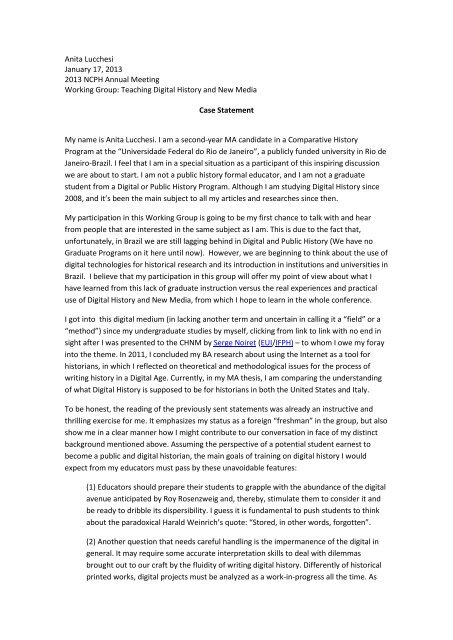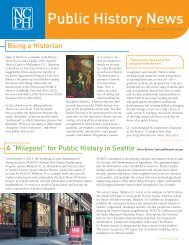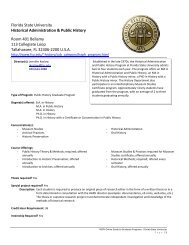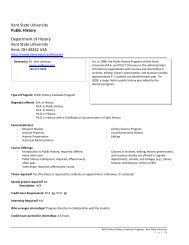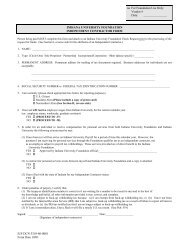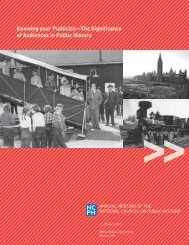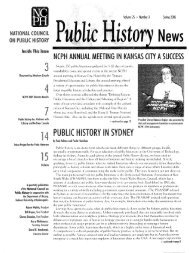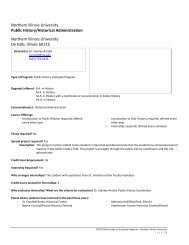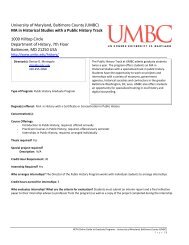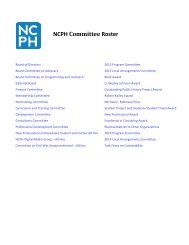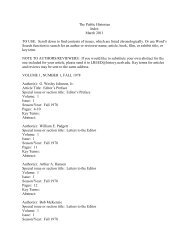Case Statement - National Council on Public History
Case Statement - National Council on Public History
Case Statement - National Council on Public History
You also want an ePaper? Increase the reach of your titles
YUMPU automatically turns print PDFs into web optimized ePapers that Google loves.
Anita Lucchesi<br />
January 17, 2013<br />
2013 NCPH Annual Meeting<br />
Working Group: Teaching Digital <strong>History</strong> and New Media<br />
<str<strong>on</strong>g>Case</str<strong>on</strong>g> <str<strong>on</strong>g>Statement</str<strong>on</strong>g><br />
My name is Anita Lucchesi. I am a sec<strong>on</strong>d-year MA candidate in a Comparative <strong>History</strong><br />
Program at the “Universidade Federal do Rio de Janeiro”, a publicly funded university in Rio de<br />
Janeiro-Brazil. I feel that I am in a special situati<strong>on</strong> as a participant of this inspiring discussi<strong>on</strong><br />
we are about to start. I am not a public history formal educator, and I am not a graduate<br />
student from a Digital or <strong>Public</strong> <strong>History</strong> Program. Although I am studying Digital <strong>History</strong> since<br />
2008, and it’s been the main subject to all my articles and researches since then.<br />
My participati<strong>on</strong> in this Working Group is going to be my first chance to talk with and hear<br />
from people that are interested in the same subject as I am. This is due to the fact that,<br />
unfortunately, in Brazil we are still lagging behind in Digital and <strong>Public</strong> <strong>History</strong> (We have no<br />
Graduate Programs <strong>on</strong> it here until now). However, we are beginning to think about the use of<br />
digital technologies for historical research and its introducti<strong>on</strong> in instituti<strong>on</strong>s and universities in<br />
Brazil. I believe that my participati<strong>on</strong> in this group will offer my point of view about what I<br />
have learned from this lack of graduate instructi<strong>on</strong> versus the real experiences and practical<br />
use of Digital <strong>History</strong> and New Media, from which I hope to learn in the whole c<strong>on</strong>ference.<br />
I got into this digital medium (in lacking another term and uncertain in calling it a “field” or a<br />
“method”) since my undergraduate studies by myself, clicking from link to link with no end in<br />
sight after I was presented to the CHNM by Serge Noiret (EUI/IFPH) – to whom I owe my foray<br />
into the theme. In 2011, I c<strong>on</strong>cluded my BA research about using the Internet as a tool for<br />
historians, in which I reflected <strong>on</strong> theoretical and methodological issues for the process of<br />
writing history in a Digital Age. Currently, in my MA thesis, I am comparing the understanding<br />
of what Digital <strong>History</strong> is supposed to be for historians in both the United States and Italy.<br />
To be h<strong>on</strong>est, the reading of the previously sent statements was already an instructive and<br />
thrilling exercise for me. It emphasizes my status as a foreign “freshman” in the group, but also<br />
show me in a clear manner how I might c<strong>on</strong>tribute to our c<strong>on</strong>versati<strong>on</strong> in face of my distinct<br />
background menti<strong>on</strong>ed above. Assuming the perspective of a potential student earnest to<br />
become a public and digital historian, the main goals of training <strong>on</strong> digital history I would<br />
expect from my educators must pass by these unavoidable features:<br />
(1) Educators should prepare their students to grapple with the abundance of the digital<br />
avenue anticipated by Roy Rosenzweig and, thereby, stimulate them to c<strong>on</strong>sider it and<br />
be ready to dribble its dispersibility. I guess it is fundamental to push students to think<br />
about the paradoxical Harald Weinrich’s quote: “Stored, in other words, forgotten”.<br />
(2) Another questi<strong>on</strong> that needs careful handling is the impermanence of the digital in<br />
general. It may require some accurate interpretati<strong>on</strong> skills to deal with dilemmas<br />
brought out to our craft by the fluidity of writing digital history. Differently of historical<br />
printed works, digital projects must be analyzed as a work-in-progress all the time. As


